- Home
- Restoration Projects
- Project Search
- Recovery Monitoring and Restoration of Intertidal Oiled Mussel Beds in PWS R103-1
Project Information
Title: Recovery Monitoring and Restoration of Intertidal Oiled Mussel Beds in PWS R103-1
Project Year and Number: 1992: R103-1
Other Fiscal Years and Numbers for this Project: 2000: 00090-CLO, 1999: 99090, 1997: 97090-CLO, 1996: 96090, 1995: 95090, 1994: 94090, 1993: 93036
Principal Investigator (PI): Malin Babcock (NOAA )
Managing Agency: NOAA
Assisting Personnel: Christine Brodersen, Mark Carls, Pat Harris, Jeep Rice
Research Location: All Spill Affected Areas
Restoration Category: Damage Assessment
Injured Resources Addressed: Black Oystercatchers, Harlequin Ducks, Intertidal Organisms, Mussels
Abstract: The high concentrations of unweathered crude oil found in some mussel beds in Prince William Sound during 1991 has raised questions regarding the impact of this oil on higher organisms. The species of concern include black oystercatchers, harlequin ducks and juvenile sea otters, all of which are known to include mussels as a relatively large portion of their diet. Harlequin ducks are apparently not reproducing in Western Prince William Sound, and weaning juvenile sea otters are suffering higher mortality as well. It is possible that these injuries are the result of exposure to petroleum hydrocarbons in oiled mussel beds. The goal of this study is to document exposure to and ingestion of contaminated mussels by direct observation of foraging activities, and by analysis of blood and feces of black oystercatchers. Given the relatively large feeding range of sea otters and harlequin ducks, developing field studies that can provide useful information regarding exposure of these species to oiled mussel beds is difficult and would be very expensive. In contrast, breeding black oystercatchers establish a limited foraging territory in which they can be studied with relative ease. The researchers will study black oystercatchers in areas with oiled mussel beds to determine the extent to which these birds use oiled beds and are constantly exposed to oil. Blood and fecal samples will be collected from oystercatcher chicks which consume mussels collected by the adult birds. In addition, in cooperation with the Alaska Department of Fish and Game, blood and fecal samples will be collected from harlequin ducks captured in Western Prince William Sound. The data from these studies will provide an indication of potential exposure of black oystercatchers and harlequin ducks to oil from mussel beds in Prince William Sound. Given the methods and financial resources available to address this question, however, it will not be possible to determine with certainty the degree to which oiled mussel beds are injuring higher organisms.Proposal: Not Available
Reports:
Final Report: See Project 95090
Publications from this Project: None Available
